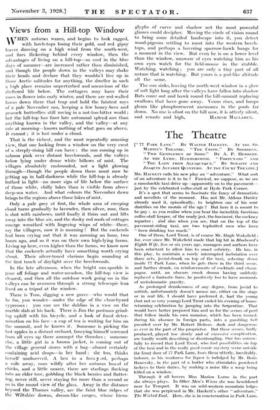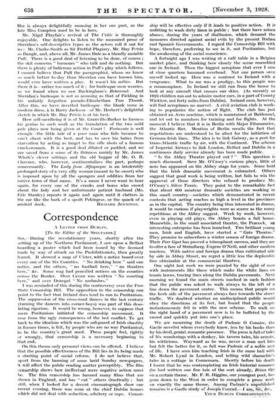The Theatre
[" 77 PARK LANE." BY WALTER HACKETT. AT THF. ST. MARTIN'S THEATRE. "THE CRITIC." By SHERIDAN. " Two GENTLEMEN OF SOHO." BY A. P. HERBERT. AT THE LYRIC, HAMMERSMITH. " FORTUNATO " AND " THE LADY FROM ALFAQUEQUE." BY SERAFIN AND JOAQUIN ALVAREZ QUINTERO. AT THE COURT THEATRE.] MR. HACKETT calls his new play an " adventure." What sort of an adventure is it to be ? Farcical, we suppose, as we see a ramshackle taxi drive up—apparently on to the pavement— just by the celebrated coffee-stall at Hyde Park Corner.
It's a spot that seems to fascinate the fancy of dramatists and novelists of the moment. Has not Mr. Aldous Huxley already used it, episodically, to heighten one of his sour diatribes on the morals of the age ? But here it is meant to be gay ; as you realize when you hear the incredibly facetious coffee-stall keeper, of the ready jest, the bontinent, the cockney repartee ; and- also when You see; that on the top of the pavement-riding taxi, are two tophatted men who have " been drinking too much."
. One of them, Lord Trent, is of course Mr. Hugh Wakefield ; for, ever since Mr. Wakefield made that big hit in Bluebeard's Eighth Wife, five or six years ago, managers and authors have been reluctant to allow him to enact sobriety. He has, in this play, to maintain a rarely interrupted inebriation over three acts, jovial-drunk on top of the taxi, sobering down inside 77 Park Lane, when he gets there in the third scene, and further drunk, on reinforcements of cocktails and cham- pagne, until, an obscure crook drama having suddenly replaced a fantastic farce, he positively has to have moments of melodramatic gravity.
As prolonged drunkenness of any degree, from jovial to sottish, unfortunately doesn't amuse me, either on the stage or in real life, I should have preferred it, had the young (but not so very young) Lord Trent ended his evening of home- returning celebration by jumping into the Serpentine. That would have better prepared him and us for the scenes of peril that follow inside his own mansion, which has been turned. during his absence in foreign parts, into a gambling hell presided over by Mr. Robert Holmes—dark and dangerous as ever in the part of the proprietor. But these scenes, badly produced, played too slowly and of excessive complication, arc hardly worth describing or disentangling. One has sorrow- fully to record that Lord Trent, who had possibilities on top of the taxi and in the really good comic mystery scene outside the front door of 77 Park Lane, loses them utterly, inevitably, indoors, as his weakness for liquor is indulged by Mr. Boris Ranevsky, in the part of a butler who stimulates powdered lackeys to their duties, by making a noise like a wasp being killed on a window.
Through it all hovers Miss Marion Lorne in the part she always plays. In Other Men's Wives she was bewildered near Le Touquet. It was on wild-western mountain ledges that she was perplexed in Mr. Hackett's other " adventure," The Wicked Earl. Here, she is in consternation in Park Lane.
She is always delightfully amusing in her one part, as the late Miss Compton used to be in hers.
Mr. Nigel Playfair's revival of The Critic is thoroughly enjoyable. One delights to listen to the measured prose of Sheridan's self-descriptive types as the actors roll it out for us ; Mr. Clarke-Smith as Sir Fretful Plagiary, Mr. Hay Petrie as Dangle, and, above all, Mr. James Dale as a blandly amiable Puff. There is a good deal of listening to be done, of course ; the skit concerns " humours " who talk and do nothing. But there is plenty of ludicrous action in Puff's play which follows. I cannot believe that Puff the paragraphist, whom we know so much better to-day than Sheridan can have known him, would ever have written a play. It wasn't his métier. But there it is—rather too much of it ; for burlesque soon wearies, as we found when we saw Buckingham's Rehearsal. And Sheridan's burlesque is not so amusing as that of Fielding in his unfairly forgotten pseudo-Elizabethan Tom Thumb. After this, we have inverted burlesque—the blank verse in modern dress, a la Barry Jackson—of Mr. Herbert's delightful sketch in which Mr. Hay Petrie is at his best.
How self-sacrificing it is of Mr. Granville-Barker to harness his genius to such work as the translation of the two mild pale plays now being given at the Court ! Fortunato is well enough—the little tale of a poor man who fails because he can't cheat with the best, and- has to save his babes from starvation by acting as target to the rifle shots- of a famous crackswoman. It is a good deal diluted or padded, and we arc saved from a sense of its thinness mainly by Mr. James Whale's clever settings and the old beggar of Mr. 0. B. Clarence, who, however, sentimentalizes the part, perhaps unnecessarily. The Lady from Alfaqueque is an intolerably prolonged story of a very silly woman (meant to be sweet) who is imposed upon by all the spongers and oddities from her native town of that name. It's a name I never want to hear again, for every one of the cranks and bores who crowd about the lady and her unfortunate patient husband (Mr. Eric Stanley) repeats it again and again until it clatters in the ear like the hark of a spoilt Pekingese, or the quack of a



















































































































 Previous page
Previous page